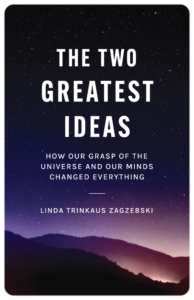At the heart of the intellectual and cultural awakening that swept across the globe during the first millennium BCE—an era that witnessed the emergence of philosophy, mathematics, science, and nearly all of the world’s major religions—lies a transformative conviction: the human mind is capable of comprehending the universe. Equally profound is the parallel insight that the mind is capable of reflecting upon and understanding itself.
In her book “The Two Greatest Ideas: How Our Grasp of the Universe and Our Minds Changed Everything” Professor Linda Zagzebski offers a compelling examination of these two foundational ideas in human history. She traces how their dynamic interplay has generated enduring tensions, leaving humanity divided in its understanding of the relationship between consciousness and the cosmos. The book argues that these tensions have long shaped debates over how society should be organized—whether in harmony with the natural order or in pursuit of individual autonomy—and they continue to underlie conflicts on issues such as abortion, the environment, free speech, and identity. The book further envisions the rise of a third transformative idea: that human minds can genuinely understand one another, opening the possibility of grasping reality in its entirety. In this episode of Bridging the Gaps, I speak with Professor Linda Zagzebski.
Linda Zagzebski is Professor Emerita and the Kingfisher College Chair of the Philosophy of Religion and Ethics Emerita at the University of Oklahoma.
We begin our discussion by examining the two central ideas highlighted in Zagzebski’s book: first, that the human mind can grasp the universe, and second, that it can grasp itself. While these notions feel ever-present in contemporary thought, it is easy to forget that they emerged gradually in human history. We consider their significance and origins, tracing early expressions of these ideas in mathematics, astronomy, art, and philosophy. This includes reflections on ancient conceptions of a unified reality governed by a single principle, exemplified in Pythagorean thought, which envisioned the cosmos as bound together by number—a view that continues to echo in Western intellectual traditions. We discuss the discovery of subjectivity and its impact on art and science.
Our conversation then turns to Zagzebski’s proposal of a possible third great idea: that the human mind can grasp another mind. From there, we reflect on enduring questions: Can we ever fully understand the nature of reality? What drives the uniquely human impulse to seek knowledge of the whole? Finally, we delve into the book’s exploration of the concept of self and consider why our curiosity about reality sets us apart from other animals.Overall, this has been an illuminating and thought-provoking discussion.
Complement this discussion with Robots, Artificial Life and Technology Imagined by the Ancients with Adrienne Mayor and then listen to “The Human Journey From Ape to Agriculture” with Professor Peter Bellwood.


Connect With Us